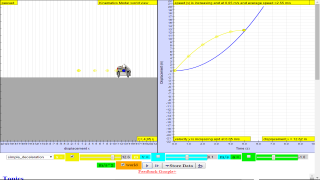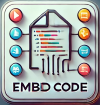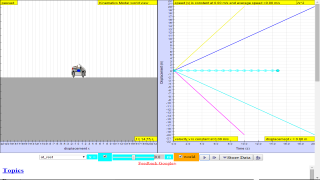About
Topics
KinematicsSpeed, velocity and acceleration
Graphical analysis of motion
Description
This simulation has a drop-down menu for exploration of(i) at rest use of progressive mathematical model is encouraged X = 0 for example
(ii) moving with uniform velocity, use of progressive mathematical model is encouraged for example X = 1*t for a constant velocity motion of v =1 m/s
(iii) moving with non-uniform velocity (eg, constant acceleration) use of progressive mathematical model is encouraged for example X = 0.5*1*t^2 for a constant acceleration motion of a =1 m/s^2
When only the velocity-time graph check-box is selected, it can be explored for the following cases too.
(i) at rest ,
(ii) moving with uniform velocity (eg, no acceleration)
(iii) moving with uniform acceleration (eg, constant acceleration = 9.81 m/s^2)
Sample Learning Goals
(f) deduce from the shape of a displacement-time graph when a body is:
(i) at rest example of progressive mathematical model is encouraged X = 0
(ii) moving with uniform velocity example of progressive mathematical model is encouraged X = 1*t for a constant velocity motion of v =1 m/s
(iii) moving with non-uniform velocity example of X = 0.5*1*t^2 for a constant acceleration motion of a =1 m/s^2
(g) deduce from the shape of a velocity-time graph when a body is:
(i) at rest
(ii) moving with uniform velocity
(iii) moving with uniform acceleration
(iv) moving with non-uniform acceleration
Version:
Translations
| Code | Language | Translator | Run | |
|---|---|---|---|---|
 |
||||
Credits
 This email address is being protected from spambots. You need JavaScript enabled to view it.
This email address is being protected from spambots. You need JavaScript enabled to view it.
Briefing Document: Secondary Kinematics Simulation Model
1. Overview
This document reviews the "Secondary Kinematics or Moving Car 1D JavaScript HTML5 Applet Simulation Model," an interactive, open educational resource developed by Open Educational Resources / Open Source Physics @ Singapore. This model is designed to help students understand kinematics concepts through simulation and graphical analysis. The model is accessible via web browsers and mobile devices, focusing on 1D motion.
2. Key Themes and Concepts
- Kinematics Focus: The simulation specifically addresses fundamental concepts of kinematics, including:
- Speed, velocity, and acceleration.
- Graphical analysis of motion using displacement-time and velocity-time graphs.
- 1D Motion: The model is restricted to one-dimensional motion (a straight line), which allows for a more focused and simplified analysis of basic kinematic principles.
- Progressive Mathematical Models: The simulation strongly encourages students to connect physical motion with mathematical models. This involves expressing displacement as a function of time, such as:
- X = 0 (at rest)
- X = 1*t (constant velocity of 1 m/s)
- X = 0.5*1*t^2 (constant acceleration of 1 m/s²)
- Graphical Interpretation: A central learning objective is the interpretation of displacement-time and velocity-time graphs, including:
- Identifying when an object is at rest.
- Identifying when an object is moving with uniform velocity (no acceleration).
- Identifying when an object is moving with uniform (constant) acceleration.
- Identifying when an object is moving with non-uniform acceleration.
- Interactive Learning: The applet’s interactive nature allows students to manipulate variables and observe the effects on graphs and motion, fostering a hands-on learning experience.
- Pedagogical Approach: The lesson implementation suggests using the simulation as a "mystery" to engage students. For example, they could be tasked with finding a mathematical model that predicts future car movements. This allows teachers to gauge students' existing knowledge and address any gaps. The use of existing school platforms like Edmodo and Whatsapp for collaborative learning is also encouraged.
- Open Source & Accessibility: The simulation utilizes HTML5 and JavaScript, making it accessible across various devices, and it's a free open educational resource.
3. Core Functionality and Use Cases
- Drop-Down Menu Exploration: The simulation uses a drop-down menu for exploration of different motion scenarios, specifically:
- (i) at rest
- (ii) moving with uniform velocity
- (iii) moving with non-uniform velocity (including constant acceleration)
- Graphical Analysis: By selecting the "velocity-time graph" checkbox, the model allows exploration of cases:
- (i) at rest
- (ii) moving with uniform velocity (no acceleration)
- (iii) moving with uniform acceleration (constant acceleration)
- (iv) moving with non-uniform acceleration.
- Learning Goals: The sample learning goals include being able to plot and interpret displacement-time and velocity-time graphs, and to deduce an object's motion based on the shape of these graphs.
4. Key Quotes & Supporting Details:
- On Mathematical Modeling: "use of progressive mathematical model is encouraged for example X = 0 for example... X = 1t... X = 0.51*t^2"
- On Learning Goals: "plot and interpret a displacement-time graph and a velocity-time graph... deduce from the shape of a displacement-time graph... deduce from the shape of a velocity-time graph"
- On Pedagogical Approach "Give the challenge to solve the mystery of a predictive equation that can be use to tell the future, more precisely the movement of a car, in a physics lesson."
5. Technical Details & Credits
- The simulation was compiled using EJS (Easy JavaScript Simulation). It was tested with the version EJS_5.1_150302.
- The model is part of a larger family of open educational resources developed by the team.
- Credits are given to multiple contributors including Francisco Esquembre, Wolfgang Christian, and Felix Jess Garcia Clemente.
6. Related Resources
- The resource is a part of a broader suite of simulations. The resource includes links to other kinematics simulations from external sources, such as "http://www.physicsclassroom.com/Physics-Interactives/1-D-Kinematics/Graphs-and-Ramps" and "http://www.thephysicsaviary.com/Physics/Programs/Labs/EquationsOfMotionLab/index.html"
- It includes links to video tutorials to aid understanding.
7. Conclusion
This "Secondary Kinematics or Moving Car 1D JavaScript HTML5 Applet Simulation Model" is a valuable resource for physics education. Its interactive nature, focus on graphical analysis, and emphasis on mathematical modeling provide a robust learning experience. The applet’s accessibility across multiple devices and the open source nature of the project enhance its usability in educational settings. Its pedagogical approach leverages technology to encourage active engagement and understanding.
Kinematics Simulation Study Guide
Quiz
Answer each question in 2-3 sentences.
- What are the three primary motion scenarios that can be explored using the kinematics simulation?
- What progressive mathematical model is suggested for an object at rest in the simulation?
- How does the simulation help in understanding uniform velocity, and what mathematical model can be used for this scenario?
- What is a suggested mathematical model for a motion with constant acceleration, according to the simulation?
- What two types of graphs does the simulation allow users to plot and interpret?
- What can you deduce from the shape of a displacement-time graph when an object is at rest?
- How can you distinguish uniform velocity from non-uniform velocity using a displacement-time graph?
- What does the shape of a velocity-time graph indicate when an object has uniform acceleration?
- Besides the primary motion scenarios, what additional cases can be explored when only the velocity-time graph is selected?
- According to the provided text, what is the role of "mystery" in the pedagogical approach to teaching physics with simulations?
Answer Key
- The three primary motion scenarios that can be explored are a body at rest, a body moving with uniform velocity, and a body moving with non-uniform velocity. These can be modeled mathematically and visualized graphically.
- The suggested mathematical model for an object at rest is X = 0. This signifies that the object's position remains constant over time.
- The simulation helps users understand uniform velocity by showing a constant rate of change in position over time; it can be modeled as X=1*t, signifying a constant velocity of 1 m/s.
- A suggested mathematical model for motion with constant acceleration is X = 0.51t^2, which corresponds to a constant acceleration of 1 m/s^2.
- The simulation allows users to plot and interpret displacement-time graphs and velocity-time graphs. These graphs provide a visual representation of an object's motion.
- When an object is at rest, the displacement-time graph will be a horizontal line. This indicates that the object's position is not changing over time.
- On a displacement-time graph, uniform velocity is represented by a straight line with a constant slope, while non-uniform velocity will be represented by a curved line with changing slope.
- A straight line with a constant slope on a velocity-time graph indicates uniform acceleration, as it represents a consistent change in velocity over time.
- When only the velocity-time graph is selected, the simulation allows the exploration of cases such as at rest, moving with uniform velocity, moving with uniform acceleration, and moving with non-uniform acceleration.
- In the pedagogical approach, "mystery" involves presenting a challenge, like the creation of a predictive model, to engage students, and to assess their prior knowledge to identify areas where the teacher can offer personalized support.
Essay Questions
Consider the following questions and write a multi-paragraph essay for each, drawing on the source material:
- Discuss the importance of graphical analysis in understanding kinematics, and explain how the simulation helps users interpret displacement-time and velocity-time graphs.
- Explain how the kinematics simulation facilitates the use of mathematical models, and how these models help predict motion for various scenarios of constant velocity and acceleration.
- Analyze the pedagogical approach outlined in the text, including the "mystery" and "little professor" methods, and describe how these strategies can help students better understand kinematics.
- How does the simulation support different learning goals, specifically concerning the shape and interpretation of displacement-time and velocity-time graphs under different motion conditions?
- How can students and teachers use other supplementary resources and simulations to aid learning about kinematics concepts?
Glossary of Key Terms
Kinematics: The branch of mechanics that deals with the motion of objects without considering the forces that cause the motion. It focuses on describing motion using parameters like displacement, velocity, and acceleration.
Displacement: A vector quantity that refers to the change in position of an object. It’s the shortest distance between the initial and final positions, with direction.
Velocity: A vector quantity that describes the rate of change of an object's displacement. It indicates both the speed and direction of motion.
Uniform Velocity: Motion of an object where its velocity is constant and does not change over time. This means both the speed and direction of the object are not changing.
Acceleration: A vector quantity that describes the rate of change of an object's velocity. It indicates how quickly the velocity is changing over time.
Uniform Acceleration: Motion of an object where its acceleration is constant and does not change over time. This means the velocity changes at a steady rate.
Non-uniform Velocity: Motion of an object where its velocity changes over time. This means either the speed, direction, or both are changing.
Non-uniform Acceleration: Motion of an object where its acceleration changes over time. This means the rate of change of the velocity itself is changing.
Displacement-time graph: A graph that plots the position (displacement) of an object against time. The slope of this graph indicates the velocity.
Velocity-time graph: A graph that plots the velocity of an object against time. The slope of this graph indicates the acceleration and the area under the graph indicates the displacement.
Mathematical Model: A representation of a real-world system or scenario using mathematical concepts and equations. In kinematics, they describe the relationship between displacement, velocity, acceleration, and time.
Pedagogy: The method and practice of teaching, including the principles, strategies, and approaches used to facilitate learning.
Worksheet
- Slides for Workshop Link1 , Link2
- Final version Link1, Link2 by Lyna, Gavin, Dave and lookang
- Motion in One Dimension student worksheet (dl-gwf) Link1, Link2 by Lyna, Gavin, Dave and lookang
Video
- https://youtu.be/ZYIeBKDBXU8 Kinematics 1d simulation video tutorial with modeling pedagogy by lookang lawrence wee
- https://youtu.be/SsSPd6I4BnA Kinematics 1D simulation running on hmtl5 Modeling pedagogy 2 by lookang lawrence wee
- Kinematics Simulation - Secondary & JC by Dave Lommen
Pedagogical Writeup
| Process | Lesson Implementation | |
| Sub-Process(es) | Introducing the Lesson / Arousing and Sustaining Interest | |
| Teaching Action | Mystery | |
Technology:
mystery could take the form an describe it all equation, called model.
Give the challenge to solve the mystery of a predictive equation that can be use to tell the future, more precisely the movement of a car, in a physics lesson.
Through the model selected by the students, it gives an indication of the students prior knowledge about what they know now, so that the teacher can understand the gaps of understanding for personalised mentoring https://sg.iwant2study.org/ospsg/index.php/interactive-resources/physics/02-newtonian-mechanics/01-kinematics/38-kinematics-1d
| Process | Lesson Implementation | |
| Sub-Process(es) | Introducing the Lesson / Arousing and Sustaining Interest | |
| Teaching Action | Little Professor/Little Teachers | |
Technology:
use exisiting schools' learning management system such as https://www.edmodo.com/ or Whatapp group chat to allow of arousing and sustaining interest.
Other simulations
- http://www.physicsclassroom.com/Physics-Interactives/1-D-Kinematics/Graphs-and-Ramps
- http://www.thephysicsaviary.com/Physics/Programs/Labs/EquationsOfMotionLab/index.html
Project related:
Understanding Teacher Learning Community as Support for Implementation of Open Source Physics for Conceptual Instruction
Project Number: OER 10/15 GWF
Project Duration: 01 July 2015 - 30 April 2017
http://weelookang.blogspot.sg/2015/07/understanding-teacher-learning.html
Family of Resources
| Junior College | Primary | ||||||||||
About
TopicsKinematicsSpeed, velocity and acceleration Graphical analysis of motion DescriptionThis simulation has a drop-down menu for exploration of(i) at rest use of progressive mathematical model is encouraged X = 0 for example (ii) moving with uniform velocity, use of progressive mathematical model is encouraged for example X = 1*t for a constant velocity motion of v =1 m/s (iii) moving with non-uniform velocity (eg, constant acceleration) use of progressive mathematical model is encouraged for example X = 0.5*1*t^2 for a constant acceleration motion of a =1 m/s^2 When only the velocity-time graph check-box is selected, it can be explored for the following cases too. (i) at rest , (ii) moving with uniform velocity (eg, no acceleration) (iii) moving with uniform acceleration (eg, constant acceleration = 9.81 m/s^2) Sample Learning Goals
(e) plot and interpret a displacement-time graph and a velocity-time
graph
(f) deduce from the shape of a displacement-time graph when a body is: (i) at rest example of progressive mathematical model is encouraged X = 0 (ii) moving with uniform velocity example of progressive mathematical model is encouraged X = 1*t for a constant velocity motion of v =1 m/s (iii) moving with non-uniform velocity example of X = 0.5*1*t^2 for a constant acceleration motion of a =1 m/s^2 (g) deduce from the shape of a velocity-time graph when a body is: (i) at rest (ii) moving with uniform velocity (iii) moving with uniform acceleration (iv) moving with non-uniform acceleration Version:Translations
Credits
|
|||||||||||
FAQ: Exploring Kinematics with Interactive Simulations
- What is the purpose of the "Secondary Kinematics or Moving Car 1D" simulation?
- This simulation is designed to help students understand and visualize the concepts of kinematics, specifically focusing on motion in one dimension. It allows users to explore different types of motion—at rest, uniform velocity, and non-uniform velocity (including constant acceleration)—using a dynamic, interactive model of a moving car. It also allows you to explore displacement-time and velocity-time graphs for these scenarios. It is intended for use in secondary level physics education and supports the use of mathematical modeling to describe movement.
- How does the simulation encourage the use of mathematical models in physics?
- The simulation encourages the use of mathematical models by prompting students to describe motion using equations. For example, the simulation suggests using "X=0" for an object at rest, "X=1t" for uniform velocity (where velocity is 1 m/s), and "X=0.51*t^2" for constant acceleration (where acceleration is 1 m/s^2). This approach allows students to connect the abstract equations to concrete visual representations of motion.
- What types of motion can be explored using the simulation?
- The simulation allows exploration of four main types of motion: an object at rest, an object moving with uniform velocity (constant speed and direction), an object moving with constant acceleration, and an object moving with non-uniform acceleration. When the velocity-time graph mode is selected you can also observe these scenarios from a velocity perspective.
- What are some sample learning goals associated with the simulation?
- Some key learning goals include plotting and interpreting displacement-time and velocity-time graphs, and deducing the type of motion a body is experiencing based on the shape of the graphs. Specifically, students should be able to identify when an object is at rest, moving with uniform velocity, or moving with uniform or non-uniform acceleration from these graphs.
- Can the simulations be used on various devices?
- Yes, the simulations are designed to be compatible with a wide range of devices including Android and iOS phones/tablets/iPads and Windows, MacOSX, and Linux laptops/desktops and ChromeBook Laptops because they are based in HTML5 and Javascript. This makes them accessible in a variety of classroom and home environments.
- What other pedagogical approaches or resources support this simulation?
- The simulation is also supported by pedagogical write-ups, workshop materials (slides and worksheets), and video tutorials. These resources emphasize the use of inquiry-based learning, collaborative learning, and the integration of technology into physics education. There is an emphasis on allowing students to take the perspective of "little professors" or "little teachers".
- Beyond the core simulation, what other resources are available on this site?
- This website offers a wide variety of other interactive physics simulations covering topics such as: projectile motion, energy of satellites in circular orbits, vertical circular motion, simple harmonic motion, Kepler's laws, electric and magnetic fields, wave phenomena, atomic models, radioactive decay, and many others. The site contains a large collection of simulations and experiments. It also provides links to open educational resources and project information.
- What is the philosophy behind the use of these Open Source Physics simulations?
- The site and resources promote open-source educational tools that are free to use and modify by students and teachers. It promotes the development of modelling and inquiry skills. These resources are designed to be used to encourage collaborative learning, and to fill gaps in understanding by using mathematical models to describe the natural world.
- Details
- Parent Category: 03 Motion & Forces
- Category: 01 Kinematics
- Hits: 12204









.png
)




